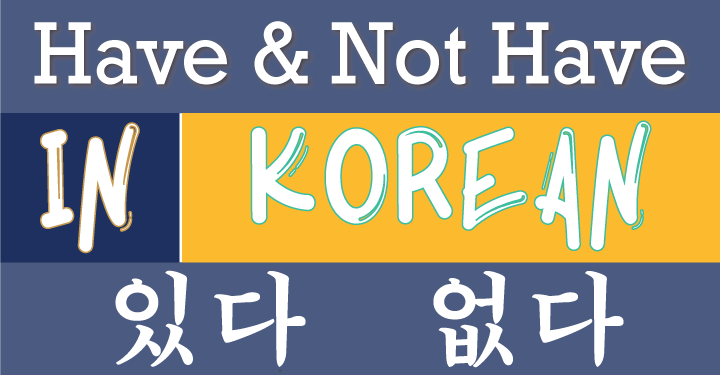
있다 “Have” in Korean
없다 “Not have” in Korean
있다 has countless uses in Korean. The two main uses of 있다 are “Have” and “Be/Exist at a location.” 없다 is the opposite of 있다. In English we have to say “I don’t have.” Korean has a single word for “Not have” which is 없다.
This lesson will teach you 있다 “Have” in Korean and 없다 “Not have” in Korean.
Ex. “She has a hat.” or “I have a lovely bunch of coconuts.”
“She doesn’t have a hat.” or “I don’t have a lovely bunch of coconuts.”
있다 “To have” in Korean (Present Tense)
있다 is a descriptive verb. This means 있다 describes a noun marked by the Korean subject particles 이/가.
있다 “Have” Plain Dictionary Form Sentence Structure
Topic은/는 Subject이/가 있다
| 나는 신발이 있다 |
I는 shoes이 have.
|
I have shoes.
|
| 그녀는 모자가 있다 |
I는 hat가 have.
|
I have a hat.
|
있다 “Have” with Korean Honorifics (Present Tense)
The 있다 forms below have been conjugated based on Korean Honorifics. Korean honorifics is a system which forces the speaker to change verb endings and word choice based on the relationships of the people she or he is speaking to. People older than you, in a higher position that you, and strangers often get the higher Korean honorific speech.
These sentences structures are examples of what you can use in everyday life when speaking to people.
Informal Level 있어
To conjugate 있다 to the informal level follow this formula:
있다 – 다 = 있
있 + 어 = 있어
Topic은/는 Subject이/가 있어
| 나는 신발이 있어 |
I는 shoes이 have.
|
I have shoes.
|
| 그녀는 모자가 있어 |
She는 hat가 has.
|
She has a hat.
|
Remember the pronunciation of 있어 is [이써]
Polite Level 있어요
To conjugate 있다 to the polite level follow this formula:
있다 – 다 = 있
있 + 어요 = 있어요
Topic은/는 Subject이/가 있어요
| 나는 신발이 있어요 |
I는 shoes이 have.
|
I have shoes.
|
| 그녀는 모자가 있어요 | She는 hat가 has. | She has a hat. |
Remember the pronunciation of 있어요 is [이써요]
Honorific Level 있습니다
To conjugate 있다 to the honorific level follow this formula:
있다 – 다 = 있
있 + 습니다 = 있습니다
Topic은/는 Subject이/가 있습니다
| 나는 신발이 있습니다 |
I는 shoes이 have.
|
I have shoes.
|
| 그녀는 모자가 있습니다 | She는 hat가 has. | She has a hat. |
Remember the pronunciation of 있습니다 is [이씀니다]
Learn Korean Language Tips
If the topic is known, you don’t need to say it.
Also, if the subject is known, you don’t need to say it.
Ex.
A: Do you have shoes?
B: 나는 신발이 있어요.
Changes to:
A: Do you have shoes?
B: 신발이 있어요.
Or:
A: Do you have shoes?
B: 있어요.
[rad_rapidology_inline optin_id=optin_5]
없다 “To not have” in Korean
(Present Tense)
없다 “Not have” Plain Dictionary Form Sentence Structure
Topic은/는 Subject이/가 없다
| 나는 신발이 없다 |
I는 shoes이 don’t have.
|
I don’t have shoes.
|
| 그녀는 모자가 없다 |
I는 hat가 doesn’t have.
|
She doesn’t have a hat.
|
없다 “To not have” with Korean Honorifics (Present Tense)
The 없다 forms below have been conjugated based on Korean Honorifics. Korean honorifics is a system which forces the speaker to change verb endings and word choice based on the relationships of the people she or he is speaking to. People older than you, in a higher position that you, and strangers often get the higher Korean honorific speech.
These sentences structures are examples of what you can use in everyday life when talking to people.
Informal Level 없어
To conjugate 없다 to the informal level follow this formula:
없다 – 다 = 없
없 + 어 = 없어
Topic은/는 Subject이/가 없어
| 나는 신발이 없어 |
I는 shoes이 don’t have.
|
I don’t have shoes.
|
| 그녀는 모자가 없어 |
She는 hat가 doesn’t have.
|
She doesn’t have a hat.
|
Remember the pronunciation of 없어 is [업서]
Polite Level 없어요
To conjugate 없다 to the polite level follow this formula:
없다 – 다 = 없
없 + 어요 = 없어요
Topic은/는 Subject이/가 없어요
| 나는 신발이 없어요. |
I는 shoes이 don’t have.
|
I don’t have shoes.
|
| 그녀는 모자가 없어요. |
She는 hat가 doesn’t have.
|
She doesn’t have a hat.
|
Remember the pronunciation of 없어요 is [업서요]
Honorific Level 없습니다
To conjugate 없다 to the honorific level follow this formula:
없다 – 다 = 없
없 + 습니다 = 없습니다
Topic은/는 Subject이/가 없습니다
| 나는 신발이 없습니다 |
I는 shoes이 don’t have.
|
I don’t have shoes.
|
| 그녀는 모자가 없습니다 |
She는 hat가 doesn’t have.
|
She doesn’t have a hat.
|
Remember the pronunciation of 없습니다 is [업씀니다]
Learn Korean Language Tips
Remember if the topic is known, you don’t need to say it.
Also, if the subject is known, you don’t need to say it.
있다 “Have” Vs. 있다 “Exist/Be at a location”
This is why it is important to use the Korean marking particles: